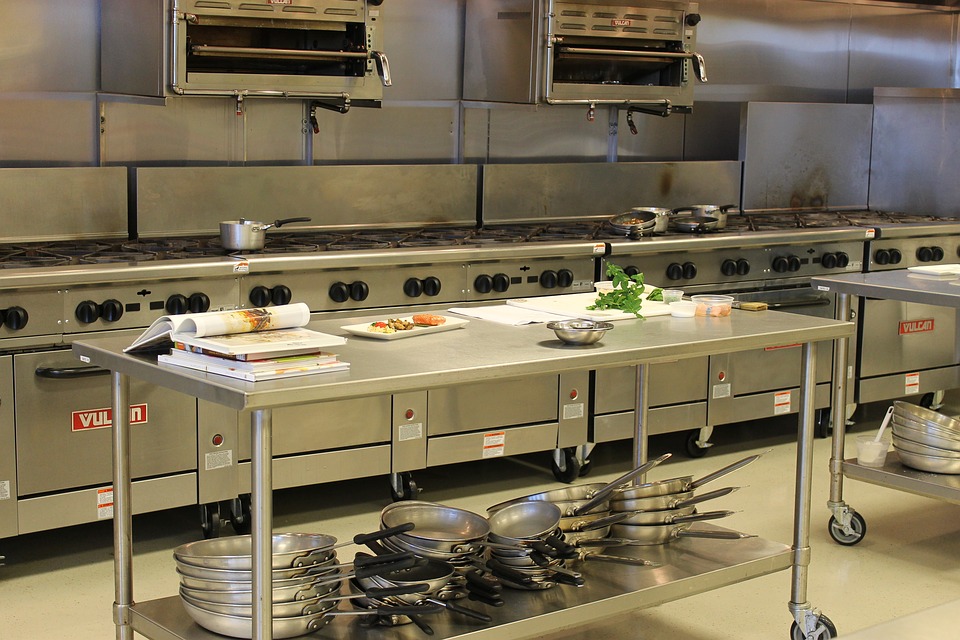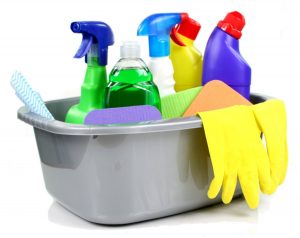Kitchens are always a challenge to keep clean. With so much commotion and people constantly working, it’s no wonder kitchens get dirty over time. Restaurant and commercial kitchens are especially prone to buildup of oil, grime and other debris. This is why it’s essential to arrange a proper clean once or twice every year for all commercial kitchens. Many parts of the restaurant, such as the floors need to be checked and cleaned thoroughly, but there are parts that aren’t as visible. Commercial hood suppression systems are important for safety, when they get dirty, they pose a fire hazard and air quality in the kitchen may be negatively affected. Restaurant hood cleaning is something that some commercial kitchen managers either neglect or forget, but it’s a necessary part of keeping your commercial kitchen safe.
What is a Restaurant Hood Suppression System?
The restaurant hood suppression system helps to keep restaurants safe by controlling fire hazards. Whenever there’s a risk of a gas fire, the suppression system will kick in and cut off gas supply to stoves. Restaurant hood suppression systems can also control grease fires by dispensing a specially-formulated extinguishing agent from nozzles if a fire is detected in the kitchen.
Another important function of restaurant hood suppression systems is ensuring air quality. During cooking, a lot of smoke, water vapor and other particles get released into the air. By ventilating the air in the kitchen, the hood systems help to keep air safe to breathe and comfortable to work in.
There are different types of restaurant hood suppression systems, so it’s important that every restaurant owner know what functionality is built into their system.
While restaurant hoods are common in restaurants, they can also be found in other commercial kitchens at catering companies, cooking schools, fast food outlets, grocery stores and movie theaters.
Why Clean Your Restaurant Hood System?
The National Fire Agency, requires you to maintain your restaurant hood system. Maintaining your system means you’re responsible to see to it that the restaurant hood is functional, and clean. Looking after your restaurant hood system means having it inspected regularly by a qualified technician and cleaned according to schedule by professional cleaners.
If you fail to comply to the guidelines set out be the NFPA, you will be held fully accountable if a fire starts in your commercial kitchen. The cost of keeping your hood system clean shouldn’t stop you from complying to safety guidelines.
Because maintaining air quality is an important function of hood suppression systems, restaurant hood cleaning will make the kitchen space more comfortable. Ventilation of smoke from cooking means unpleasant smells won’t travel from the kitchen to where your customers are. Lowering the amount of water vapor in the air from steam means that the kitchen won’t become a damp, hot, uncomfortable working environment.
Restaurant hood cleaning is important because is manages fire hazards while also ensuring your commercial kitchen is a good environment for employees and customers alike.
Restaurant Hood Cleaning and Safety Tips
It’s essential that you make a good choice when choosing professionals to help you maintain and clean your restaurant hood. Be sure to work with a company that fulfills all the necessary legal requirements. This normally means you’ll have to hire a company that has some insurance in place. Working with insured service providers means you’ll have some form of cover in case of accidental damage to your property during service delivery, for example.
Another way to make sure your restaurant hood system is helping you keep your commercial kitchen at its peak is to train staff on the functionality of the system. Hood suppression systems often have useful features built-in, but to take advantage of them, staff must know how to operate the equipment properly.
When training employees, also ensure you cover basic cleaning of the equipment. The restaurant hood should be wiped down daily in the same way counter tops are wiped.
Filters also need to be cleaned regularly by your staff. Read the instructions from your supplier on where to locate filters and how to clean them. Often cleaning filters is as simple as putting them in your washer for a clean. For kitchens with high output, grease extractor filters must ideally be cleaned weekly or bi-weekly. Be sure to read any instructions provided with your system to identify other filters that need to be cleaned. Filters will generally differ from one system to another, which is why it’s important that you know your specific hood system well.
How Often to Clean Your Hood Suppression System?
How often you’ll need to book a restaurant hood cleaning will depend on your commercial kitchen. The kind of cooking you do and volume of food your produce will all influence how often your hood suppression system will need cleaning. Guidelines set out by the NFPA are as follows:
- Commercial kitchen operating at high volume require quarterly cleaning
- Moderate production kitchens require cleaning about twice a year
- Kitchens with low output can function with an annual clean
High volume kitchens typically operate hours on end each day. Restaurants that are open for 12 hours or more daily are likely to qualify as high volume kitchens. Commercial kitchens where deep frying, pan frying and other messy jobs are performed daily are also likely to be high volume.
Moderate production kitchens can include kitchens at restaurants that are only open in the evenings, for instance. Low output kitchens are ones that only operate occasionally, such as seasonal restaurants, churches and campsites that are only visited occasionally.
Booking a Commercial Kitchen Hood Cleaning: What is the Process?
Before booking with a company to clean your restaurant hood system, be sure to ask if they have adequate experience cleaning commercial kitchen equipment. A lot of the cleaning process will require the cleaner to have some knowledge on how hood systems typically work and what parts need cleaning.
You should realize that your hood suppression system comprises of more than the parts you see in your kitchen. Apart from the hood, your suppression system also has ducts, filters and a fan. When hiring a professional, each part of your hood system must be cleaned meticulously, ensuring it’s clean enough to fulfill safety standards.
One of the best and most common ways to clean a restaurant hood is through pressure washing. Pressure washing restaurant hoods is an effective way to remove tough dirt and grime from grease, particles of foodstuffs and more.
Process of Pressure Cleaning Restaurant Hoods
Before cleaning, cleaners will typically disconnect certain parts and fix protective plastic covers where necessary. During this phase, filters will also be removed. Once contractors start cleaning, everything from the roof and ducts down to the kitchen should be cleaned.
Cleaning the a restaurant hood takes a lot of work, inspecting every corner for dirt and buildup. Certain parts may also need replacement, so it’s important to work with cleaners that know what to look for when inspecting the hood system. While some contractors might be able to replace parts, replacement of parts can also be done by a qualified technician after cleaning.
Be sure to have the system inspected by a qualified professional immediately after cleaning. A technician can check for leaks, replace parts and perform a general service on your equipment. Ideally, your service technician and cleaning contractor should work together when after cleaning to ensure everything is ready for operation.
Keeping your equipment clean for operation can seem like a large expense, but it’s worth the cost when you consider the benefit. Always have your equipment inspected by a qualified technician after cleaning. This will ensure it remains safe for operation. Servicing technicians can also assist by training staff on handling equipment and general safety guidelines.
While hiring contractors to clean your commercial kitchen hood system, you can also call in cleaners to help remove grime in other areas of your premises. Windows, floors and other areas of restaurants often have buildup that’s best removed through pressure washing.


